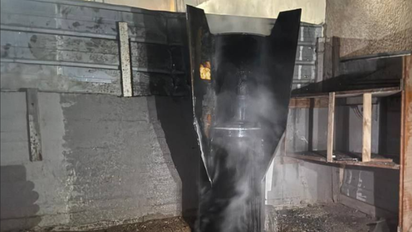Caught on camera: Iranian ballistic missile fragments found in Israel after attack, craters revealed (WATCH)

Synopsis
Tensions between Israel and Iran have surged dramatically following Tuesday's missile attack that saw nearly 200 missiles launched from Iran toward Israeli territory.
Tensions between Israel and Iran have surged dramatically following Tuesday's missile attack that saw nearly 200 missiles launched from Iran toward Israeli territory. The Israel Defense Forces (IDF) have threatened retaliation, with military spokesperson Daniel Hagari warning that the assault “will have consequences.” The missile barrage, believed to be in retaliation for the recent killings of key Hezbollah and Hamas leaders by Israeli forces, has left Israel on high alert.
Following the attack, missile fragments, identified as part of a ballistic missile launched from Iran, were found in an unidentified area in Israel. Video footage circulating across social media shows the fragments of the Iranian missile, highlighting the destructive power of the strike.
Among the hundreds of missiles fired by Iran, one reportedly struck an area near an Israeli school, leaving a large crater. Video footage from local news outlets captured the aftermath of the strike, showing debris scattered around the impact zone.
Daniel Hagari, the IDF spokesperson, addressed the nation, confirming that the missile strikes targeted various locations across Israel. He reassured the public that the IDF’s defense systems successfully intercepted many of the incoming missiles.
The Israeli military initially instructed residents to take shelter in protected spaces as the missiles rained down. However, over an hour after the barrage began, the IDF informed citizens that they could leave these spaces, signaling that the immediate threat had subsided, though the country remains on high alert.
Tehran has justified the missile strikes as a legitimate response to what it describes as “terrorist acts” by Israel. Iran’s mission to the United Nations defended the action, citing recent Israeli military operations targeting Hezbollah in Lebanon and the assassination of high-ranking Hezbollah and Hamas leaders, including Ismail Haniyeh and Hassan Nasrallah.
The Iranian Revolutionary Guard Corps (IRGC), which orchestrated the missile launch, stated that the strikes were carried out as retaliation for the killings of these leaders. Ayatollah Ali Khamenei, Iran’s supreme leader, reportedly gave the order for the attack, and Iranian officials have signaled that they are prepared for further escalation should Israel retaliate.
The missile attack comes at a time of heightened tension between Israel and Iran, following nearly a year of Israel’s military campaign against Hamas in Gaza and Hezbollah in Lebanon. With Iran signaling its readiness for further conflict and Israel vowing retaliation, the potential for a wider regional confrontation looms large.
Meanwhile, UN Secretary-General Antonio Guterres condemned the “broadening of the Middle East conflict, with escalation after escalation” following Iran's launch of ballistic missiles at Israel. This attack is viewed as retaliation for Israel’s ongoing military campaign against Hezbollah in Lebanon.
"This must stop. We absolutely need a ceasefire,” Guterres said in a statement.
Check the Breaking News Today and Latest News from across India and around the world. Stay updated with the latest World News and global developments from politics to economy and current affairs. Get in-depth coverage of China News, Europe News, Pakistan News, and South Asia News, along with top headlines from the UK and US. Follow expert analysis, international trends, and breaking updates from around the globe. Download the Asianet News Official App from the Android Play Store and iPhone App Store for accurate and timely news updates anytime, anywhere.